Manchester City are in uncharted territory ahead of Tottenham visiting the Etihad Stadium on Saturday.
Pep Guardiola's all-conquering side, who have won four successive Premier League titles, have lost their last four matches in all competitions.
It is the first time in Guardiola's managerial career that he has lost four straight games in all competitions, while it is the first time City have lost that many in a row since 2006, when they lost six on the bounce under Stuart Pearce.
A 2-1 EFL Cup defeat to Tottenham at the end of October started City's poor form, and defeats to Bournemouth, Sporting CP and Brighton followed.
With Liverpool continuing their fine form under Arne Slot, City head into the weekend five points behind the Reds.
Though with Liverpool not in action until Sunday, City can put the pressure back on by seeing off a Spurs team that lost 2-1 to Ipswich Town at home before the international break.
Here, we preview the clash using the best Opta data.
What's expected?
City have won just three of their last 10 Premier League games against Tottenham (D2 L5) and are looking to win consecutive league meetings with them for the first time since April 2019.
Yet despite that indifferent form against Spurs, City are still made the big favourites by Opta's supercomputer, which ranks their chances of victory at 59.5%.
Spurs' win probability comes in at 20.2%, while the draw is at 20.3%.
City's form has seen them drop off when it comes to the Opta supercomputer's forecast for the season, with Liverpool now the favourites to win the title (60.2%).
This match should promise goals, though.
Tottenham have scored at least twice in each of their last three Premier League away games against City, winning 3-2 in 2021-22, losing 4-2 in 2022-23 and drawing 3-3 last season. No team has ever scored multiple goals in four consecutive Premier League visits to the Etihad.
Under Guardiola (since 2016-17), City have lost more Premier League games (six) and conceded more Premier League goals (22) against Tottenham than they have against any other opponent.
Saturday's clash also sees two of the league's top three scoring teams this season go head-to-head. Spurs (23) have netted the most goals in the top tier, with City (22) joint-second alongside Brentford.
City have registered the highest xG (22.3), with Ange Postecoglou's team recording the second highest (21.7). These teams have had 401 shots between them across 22 matches this season, so expect entertainment.
Classic City, or is there something wrong?
There has been a tendency for City to take a while to get going in recent years, but they have never looked so short of form as they do now at this stage of a season.
Guardiola is on the longest losing run of his entire managerial career. Though they are the only team to have scored in every Premier League game so far this season, City have lost their last two (1-2 vs Bournemouth and Brighton). They last lost three in a row in the competition in February/March 2016, a run which included a home defeat to Tottenham.
City have already dropped seven points from winning positions this term, while they only dropped 10 from such positions across the entirety of last season.
They have gained a league-leading 13 points from losing positions, though that shows they are falling behind much more often than Guardiola would like.
The loss of Rodri to a season-ending knee injury has not helped, and City may have to dip into the market in January in search of a replacement.
Since the start of last season, City have played 13 league games without Rodri, and they have lost five of them. Their win rate without the Spaniard in the side in that time is 53.8%, while with him in the team it rises to 77.8%.
With Liverpool facing Southampton, City know they need to get back on track quickly, or they might simply have too big of a gap to bridge.
Road rage
Spurs have won just two of their last 11 Premier League away games (D2 L7), winning just once in five on the road this term. Since the start of this spell in March, no side have lost more Premier League away games than Tottenham (seven).
Postecoglou will not be changing his approach for this game, though. Spurs look to get forward at any opportunity, and the statistics back this up.
As a team, Tottenham have made more off-the-ball runs into the box than any other side in the Premier League this season (612), with Dominic Solanke having the most among players (138).
Spurs have also had the most shots inside the box of any Premier League side this term (134).
Tottenham have played more passes/crosses into the opposition box than any other side in the Premier League this season (429). There are 10 players in the division to have made 70+, with Spurs having three of those (Pedro Porro 96, James Maddison 77, Dejan Kulusevski 72).
Postecoglou promised Spurs fans a trophy this season, and their defeat of City in the EFL Cup was a big scalp, but in the league they have lost three of their last six games and are in 10th, though they are only three points off the top six.
PLAYERS TO WATCH
Manchester City - Erling Haaland
Haaland netted a hat-trick for Norway this week, taking his tally for the season to 22 for club and country.
He returned to scoring form in the Premier League against Brighton, though City could not hold on for the win. While he may not have always shown his best level, Haaland is still betting at a remarkable rate of 1.1 goals per 90 minutes in the top flight this season.
Tottenham - Dejan Kulusevski
No player has created more chances either overall (30) or from open play (25) in the Premier League this season than Kulusevski.
His pace and skill on the counter could be a real asset against City's high line.































